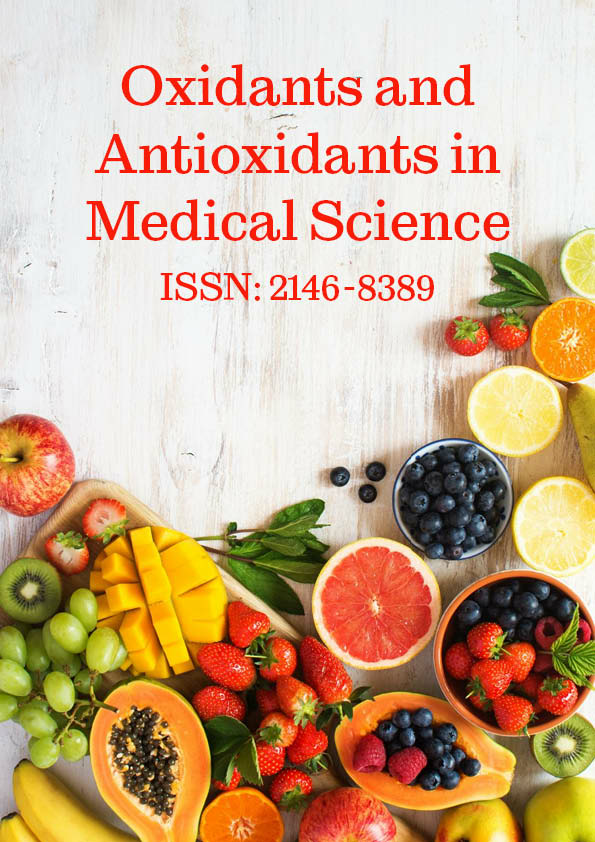Perspective - Oxidants and Antioxidants in Medical Science (2022)
Astaxanthin as an Antioxidant: Health Benefits and its Side Effects
Lij Zou*Lij Zou, Department of Chemistry, University of Dongguan, Dongguan, China, Email: Liou123@qq.com
Received: 29-Nov-2022, Manuscript No. EJMOAMS-22-82532; Editor assigned: 02-Dec-2022, Pre QC No. EJMOAMS-22-82532 (PQ); Reviewed: 19-Dec-2022, QC No. EJMOAMS-22-82532; Revised: 26-Dec-2022, Manuscript No. EJMOAMS-22-82532 (R); Published: 02-Jan-2023
Description
Astaxanthin is an antioxidant. This effect can protect cells from damage. Astaxanthin can also improve the immune system. People use astaxanthin for many purposes, including Alzheimer’s disease, athletic performance, skin aging, muscle soreness from exercise, and many others. Astaxanthin is a red pigment that belongs to a group of chemicals called carotenoids. It occurs in certain algae and causes the pink-red colour in salmon.
Health benefits of astaxanthin
As a carotenoid, astaxanthin is a fat-soluble pigment with powerful antioxidant properties that plays a role in protecting your cells from free radicals and oxidative stress. Carotenoids are known for their ability to neutralize reactive oxygen on the inner and outer layers of cell membranes. In addition, astaxanthin may provide health benefits such as,
Immune system support: Astaxanthin can affect your immune system by helping to activate white blood cells (T cells) and Natural Killer (NK) cells. While T cells attack foreign cells based on antigenic markers, NK cells do not require activation and work at a faster rate to stop invasions that can undermine your health.
Reduction in inflammation: Along with boosting the immune system, astaxanthin can also help reduce inflammation. In particular, this pigment acts on reactive oxygen species, reducing the amount of proteins that can cause inflammatory diseases such as celiac disease, rheumatoid arthritis, heart disease and diabetes.
Protection from UV skin damage: Taking supplements or eating foods rich in astaxanthin can also help protect your skin from ultraviolet damage. Astaxanthin accumulates in the epidermis and dermis layers of your skin, helping to block UV rays and reduce existing damage.
Support cognitive health: Carotenoids have a positive effect on the brain, reducing the risk of neurodegenerative diseases. Astaxanthin is a smaller molecule, which means it can cross the blood-brain barrier and add protection for your brain as well as your body’s organs. This carotenoid may also help prevent and/or slow the rate of Alzheimer’s disease and other cognitive disorders.
Healthy heart function: If you are trying to improve your heart health, you can achieve good results with astaxanthin. This carotenoid can help lower LDL, or bad cholesterol, and can raise HDL, or good cholesterol, and lower high blood pressure.
Health risks
Astaxanthin has several health benefits, but it is associated with some risks, such as,
Blood pressure drug interactions: Because astaxanthin can help lower blood pressure, you should not take it if your doctor has prescribed blood pressure medication.
Pregnancy and breastfeeding: It is not known whether astaxanthin causes side effects if you are pregnant or breast-feeding. To avoid potential risks, do not take astaxanthin supplements or large amounts of astaxanthin- rich foods while pregnant or nursing.
Allergic reactions: If you have a known seafood allergy, avoid getting astaxanthin from these sources. If you experience any allergy symptoms after eating seafood, talk to your doctor and discuss other ways to add this nutrient to your diet.
Side effects
• Taking astaxanthin may cause increased bowel movements and red stools.
• High doses of astaxanthin can cause stomach pain.
• Astaxanthin may lower blood sugar levels.
• Use cautiously in patients with hormone disorders or those using agents that affect hormones.
• It may cause low blood pressure.
• Use cautiously in patients with autoimmune disorders or those using immunosuppressants.
Copyright: © 2023 The Authors. This is an open access article under the terms of the Creative Commons Attribution NonCommercial ShareAlike 4.0 (https://creativecommons.org/licenses/by-nc-sa/4.0/). This is an open access article distributed under the terms of the Creative Commons Attribution License, which permits unrestricted use, distribution, and reproduction in any medium, provided the original work is properly cited.







